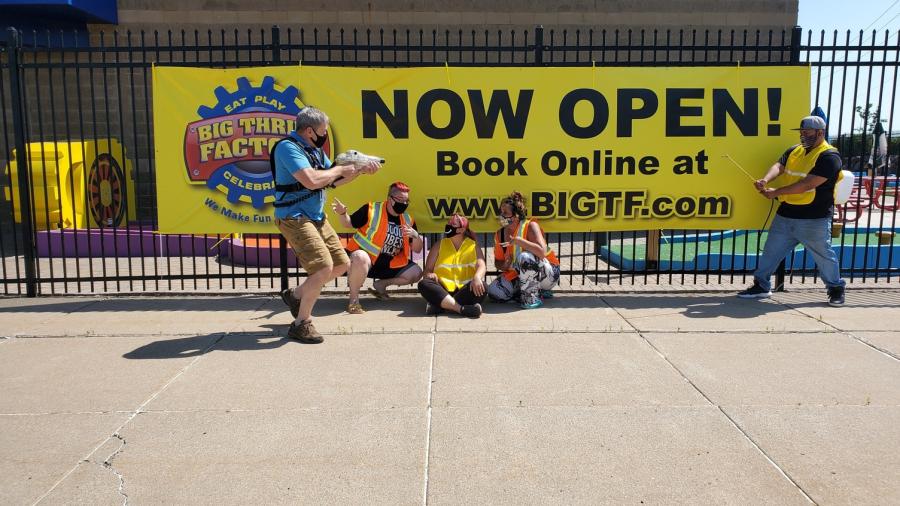FECs in the Age of Coronavirus

From the mom-and-pop businesses to the industry giants, no facet of the family entertainment center (FEC) universe has escaped COVID-19’s grasp.
“This has been the most challenging time in the company’s history,” says David McKillips, CEO of Chuck E. Cheese. “To survive, we’ve had to think differently.”
McKillips and Barry Zelickson, owner of the Big Thrill Factory, break down with Funworld how they have faced the pandemic’s challenges, made operational changes, and look to the future with hope.
CHUCK E. CHEESE
CHALLENGES
The company, which is in the midst of a financial reorganization, closed all 600 of its owned and franchised global locations in March 2020 out of an abundance of caution as coronavirus began to spread across the United States. Chuck E. Cheese started reopening its facilities in July, based on guidance from health officials in each U.S. market; as of late October 2020, about 75% of its stores had reopened to guests.
CHANGES
Chuck E. Cheese underwent some sweeping changes during 2020, and many will continue once the pandemic subsides, McKillips says. For instance:
- Move to e-ticket game cards. The company took advantage of the closure to update equipment and switch from paper to e-tickets for the arcade. “I felt passionate about this—even before the pandemic. This accelerated the decision,” McKillips says, noting they will accept paper tickets already earned by guests when playing games before the pandemic for another year. “The experience is cleaner, easier for our guests, and more efficient. There’s no lag time spent at the ticket eaters.”
- Ghost kitchen launch. As Chuck E. Cheese shut down operations in March, leadership sought ways to keep the FEC top of mind and its people working, McKillips says. “We thought the best opportunity for us was to bring a new brand to the homes of our guests.”
With a fresh menu with bolder flavors for more adult tastes, they created a ghost kitchen (a commercial kitchen operating to fulfill delivery orders only) branded Pasqually’s Pizza & Wings (named after its chef character) and established relationships with major third-party food delivery vendors.
“This really gets us into the pizza delivery business and allows us to reach new customers,” he says. “We’re seeing it grow weekly, and we’re committed to it for the long term.” - Adding seasonal promotions. Chuck E. Cheese has always celebrated Halloween, but in 2020, the company made a strategic effort with the launch of the month-long event, “Chuck E. Cheese’s Halloween Boo-tacular,” McKillips says.
“We wanted to be sensitive to those people who aren’t ready to come out and those locations not open yet,” he explains. “Anything we did in-store we wanted to mirror that experience at home.”
The company added pumpkin-shaped pizza and Halloween-themed ice cream and brownies to the menu, which guests could order for delivery or pickup. Chuck E. Cheese also produced Halloween videos families could watch at home in a partnership with Kidz Bop.
Based on the success of the “Boo-tacular,” Chuck E. Cheese just launched its “Four Seasons of Fun” initiative for winter, spring, summer, and Halloween promotions. All will feature limited-time offers on food, decorations, and new songs and dances. - “These are major entertainment immersive experiences to drive visitation and give our guests another reason to visit Chuck E. Cheese,” McKillips says.
ADVICE
FECs can’t go wrong with overly communicating with employees and guests, stresses McKillips, who has visited more than 250 locations as part of a “listening and leadership tour.”
“It’s important to set expectations for your guests and lay out what they can anticipate with the experience of coming to an FEC,” he says. “We’re a high-touch entertainment experience, and a certain percentage of people aren’t ready to visit yet. Making sure your policies and protocols are communicated to guests and employees is incredibly important.”
Also, don’t be afraid to try something new during these turbulent times, he says. While ultimately the concept didn’t come to fruition, McKillips doesn’t regret experimenting with outdoor dining at Chuck E. Cheese.
LOOKING AHEAD
“I’m incredibly proud of all the innovation we’ve seen from our team and industry. There will always be a place for family entertainment.”
— David McKillips

Big Thrill Factory
CHALLENGES
Big Thrill Factory reopened its two Minnesota FECs in July, but the pandemic—and, in particular, the resulting drop in groups and events—forced owner Barry Zelickson to permanently close his Minnetonka location two months later.
The decision, of course, didn’t come easily for the industry veteran. He changed his days and hours of operation, worked with employees to improve efficiency, moved to online reservations to control staffing, and had many long conversations with his landlord, vendors, and banks.
“It wasn’t like, ‘By the way, we’re closing,’” he says. “It was sad. A lot of employees have been with us since we opened in 2013. They were dedicated and very motivated to make this work. It was a strong effort, but we just tried to make the best decision based on the facts we had. Anything we looked at didn’t provide a long-term solution—or a long-enough scenario—that we felt could drive the business of that location.”
CHANGES
Taking a big-picture approach for his business, Zelickson shifted his resources and energy to his Oakdale facility, which traditionally relied less on events compared to his now-closed FEC.
He helped his Minnetonka employees find jobs elsewhere, and a few moved to Oakdale part time to bulk up operations there. The facility increased its overall messaging about safety and cleaning procedures and opted to temporarily shutter high-touch and physical attractions.
The results, so far?
“We’ve seen week-to-week growth for the most part,” Zelickson says. “It’s nowhere near where you want them to be, but we’ve built it to a point where it’s operationally viable.”
ADVICE
Zelickson points to several key areas on which FECs should focus their energy:
- Encourage positive feedback. Continue to keep a clean and safe environment, enforce mask use, and follow all the latest guidance from government and health officials, he advises. “Guests will then spread the word.”
- Reset expectations. Zelickson likens operating in a COVID-19 world to opening a whole new business. “It’s not the model you’ve been living on in most cases. You can’t go back historically and say this is where I should be right now,” he says.
- Try different promos. With group business affected by the pandemic, Zelickson suggests getting creative by offering employee appreciation packages. For example, market to local companies, making it easy for businesses to buy passes they can distribute to their staff. This gives guests more flexibility to visit on their own schedule and comfortably limit the size of their group.
- Skip the deep discounts. Huge deals don’t necessarily drive people to visit, he says. “It’s about showing them you’re open and here for them, and how can they utilize you.”
LOOKING AHEAD
“There will be another side to this. Trust me,I believe in the industry.”
— Barry Zelickson
Contact Funworld Contributing Editor Mike Bederka at [email protected].
